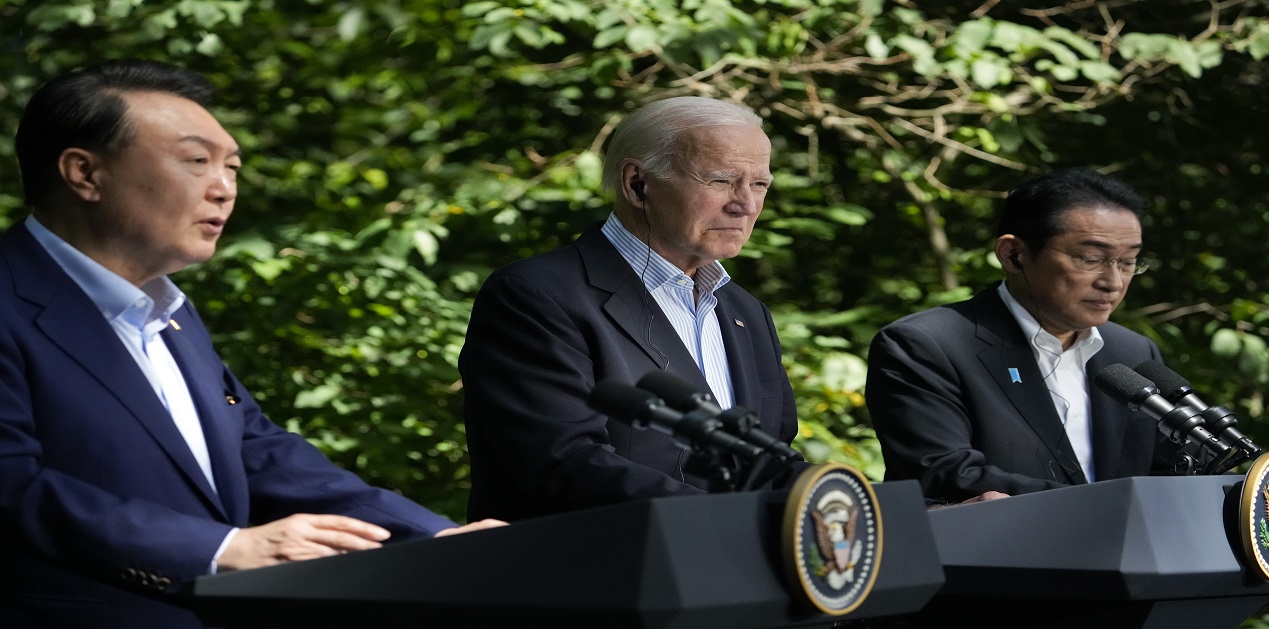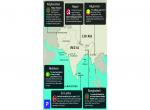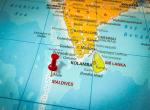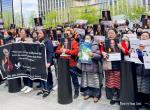Introduction
During the Group of Seven (G-7) summit hosted by Japan’s Prime Minister Fumio Kishida at his home city of Hiroshima on 21 May, US President Joe Biden announced that he will host the first stand alone trilateral summit between the leaders of Japan, South Korea and the US at the Camp David US presidential retreat in Maryland on 18 August 2023. North Korea’s “continued threat” topped the agenda. The three leaders agreed to expand trilateral cooperation “across the Indo-Pacific and beyond”. Ahead of the summit, White House press secretary Karine Jean-Pierre said in a statement that the summit aims to “advance a shared trilateral vision for addressing global and regional security challenges, promoting a rules-based international order and bolstering economic prosperity”.[1]
US President Joe Biden, Japan’s Prime Minister Fumio Kishida and South Korean President Yoon Suk-yeol have held joint meetings on the sidelines of international events, but had never held a formal trilateral summit. As expected, a joint statement condemning North Korea’s missile tests and nuclear sabre-rattling was issued. The statement called for Pyongyang to return to long-stalled denuclearisation talks.
Key Points of the Joint Statement
The joint statement underlined the geopolitical competition, climate crisis, Russia’s war of aggression against Ukraine, and nuclear provocations by North Korea. The three countries therefore resolved to put together their collective efforts to strengthen further the trilateral partnership to advance the security and prosperity of the people of the three countries and the region. This commitment entails strengthening the economies, provide resilience and prosperity, support the free and open international order based on the rule of law and bolster regional and global peace and security.[2]
The three leaders also agreed to hold trilateral meetings between the head of states, foreign and defence ministers and national security advisors, complementing the first trilateral meeting between the finance ministers and soon to be launched a new commerce and industry meeting on an annual basis. The joint statement also mentioned the launching of an annual Trilateral Indo-Pacific Dialogue to coordinate implementation of the Indo-Pacific approaches and identify new areas for common action.
Since ASEAN unity forms the fulcrum of regional peace and stability, the joint statement reaffirmed the centrality of the ASEAN and supported the ASEAN-led regional architecture. This means implementing and mainstreaming the ASEAN Outlook on the Indo-Pacific. The joint statement also touched upon the Pacific Islands issue, the economic development of the island nations and support for capacity-building as well as beefing up the newly developed Trilateral Maritime Security Cooperation Framework.
On the more critical South China Sea that has witnessed recently China’s aggressive and dangerous unlawful claims, militarisation and island building activities, the joint statement opposed any unilateral attempts to change the status quo. China has been making dangerous use of coast guard and maritime militia vessels and indulging in coercive activities to assert its unlawful claims. The joint statement therefore reaffirmed the commitment of the three countries to international law, including the freedom of navigation and over-flight, as reflected in the UN Convention on the Law of the Sea (UNCLOS). It may be remembered that the July 2016 award in the South China Sea arbitration sets out the legal basis for the peaceful resolution of maritime conflicts between the parties to that proceeding.
On the issue of Taiwan Strait, the joint statement reaffirmed the importance of peace and stability across the Taiwan Strait as an indispensable element of security and prosperity in the international community. It reiterated the importance of peaceful resolution of cross-Strait issues. The trilateral summit coincided with the US visit of William Lai, Taiwan’s Vice President and front-runner in Taiwan’s presidential election in January 2023, which evoked sharp response from China. China issued “stern warning” to Taiwan by performing air and sea drills around Taiwan. As many as 42 warplanes entered Taiwan’s air defence zone. While the US called for calm over Lai’s stopover in New York and San Francisco from a return trip to Paraguay, Taiwan strongly condemned “such irrational and provocative behaviour” by China and threatened to respond by dispatching “appropriate forces” to defend its sovereignty and territorial integrity.
The major highlight in the joint statement was on the issue of denuclearisation by North Korea in accordance with relevant UNSC resolutions and urged North Korea to abandon its nuclear and ballistic missile programmes. It condemned North Korea’s unprecedented number of ballistic missile launches, including multiple intercontinental ballistic missile (ICBM) launches and conventional military actions that pose a grave threat to peace and security on the Korean Peninsula and beyond. On its part, the US unequivocally reaffirmed its extended deterrence commitments to both Japan and South Korea and backed by the full range of US capabilities.
In mid-August 2023, the three countries had conducted a maritime ballistic missile defence warning test for the real time sharing of missile warning data to demonstrate their ability to deter and respond to North Korea’s advancing nuclear and missile threats more effectively. By the end of 2023, the three countries intend to operationalise their sharing of missile warning data on North Korea’s commitments reflected in the November 2022 Phnom Penh Statement.
Implications
It transpires therefore that the US, Japan and South Korea have legitimate concerns, especially when North Korea passed a law that made its nuclear status “irreversible” and closed all doors to negotiate on relinquishing its arsenal.[3] The trigger for the summit announcement date probably was the massive military parade overseen by Kim Jong-un with senior Chinese and Russian officials in attendance marking the 70th anniversary of the Korean War armistice. North Korea displayed its latest Hwasong-17 and Hwasong-18 intercontinental ballistic missiles believed to be capable of delivering nuclear bombs to anywhere in the US.
Regime survival seems to be the sole consideration behind Pyongyang’s acquisition and relentless pursuit of weapons and missiles capability as it is perceived to be the only means of insurance to stay in power. To demonstrate its power, it has conducted more than 100 missile tests since January 2022. The fallout of this is that South Korea and Japan have drawn closer together for the first time than ever before, notwithstanding sour ties over historical issues such as wartime labour and compensation to labour during the occupation period. The North Korean factor has also pushed Japan and South Korea as two allies of the US to see common grounds to cope with the common security challenge.
Many of the North Korean missiles have been fired over Japan’s air space, exposing vulnerability of Japan’s security. Japan’s concerns of the North Korean threat can be deciphered from Japan’s latest annual Defence White Paper released on 28 July 2023 where it clearly mentions North Korea as “an increasingly serious and imminent threat”. The White Paper also feared of a potential seventh nuclear test.
Japan has another reason to be worried about. Japan is aware that North Korea-China ties are like lips and teeth relationship. China has remained North Korea’s biggest benefactor and even vetoed sanctions resolutions at the UN Security Council. Now Japan is worried for another issue: Russia has too been drawn closer to China because of the Ukraine crisis. Both China and Russia have now chosen to prop up the regime in Pyongyang to settle score with the US as a result of Sino-US rivalry and West’s opposition to Russia’s action in Ukraine. In the process North Korea finds two benefactors and thus feels emboldened to pursue its programme on advancement of its missile and weapon development.
Russia’s endorsement of North Korea’s weapons and missile programmes was clearly visible when Russian Defence Minister Sergei Shoigu attended the military parade and was seen photographed with Kim Jong-un while viewing banned North Korean ballistic missiles at a defence expo. This clearly highlighted the shift from the earlier position of Russia where it seems to have kept distance from North Korea’s nuclear and missile ambitions.
There was yet another dimension in shifting of Russia’s policy towards North Korea. As the war in Ukraine rages on, Russia might have been worried about its dwindling stockpiles of weapons to continue fighting and may have thought of importing some of these from North Korea. When some of the weapons were seized by Ukraine forces from the Russian forces believed to be of North Korean origin, Russia was charged of conducting arms transactions, which Russia denied.
Institutionalising the Framework
A new era of trilateral cooperation was thus inaugurated and was institutionalised in a broad swath as diverse as diplomacy, education and security, mainly focussing on China’s growing assertiveness in the South China Sea and North Korea’s weapons programmes.[4] Thus with the “duty to consult” commitment, the three countries have now embarked on a new chapter. It was also agreed to establish a hotline for sharing information and coordinating responses to “regional challenges, provocations, and threats” affecting the three countries’ “collective interests and security”.[5]
Biden was impressed that both Kishida and Yoon demonstrated “political courage” in mending the bilateral relationship and took it to a new high after years of frosty ties, something unimaginable just one year ago. Prior to the Camp David summit, the three leaders had already met thrice on the sidelines of international meetings, first during a NATO summit in Madrid in summer, then in Cambodia on the sidelines of an ASEAN meeting in November and again in Hiroshima during a G-7 leaders summit in May. With the ASEAN summit scheduled in September 2023 and three leaders meeting again in November 2023 when Biden hosts the annual Asia-Pacific Economic Cooperation meeting in San Francisco, the existing Indo-Pacific architecture would get a boost further.
China’s Reactions
The three leaders have clarified a number of times that their common pledge to consult is not a formal military alliance or a collective defence commitment. Yet, China and North Korea characterised the Camp David summit as Washington’s gambit to create a “mini-NATO” in Asia. By adopting the “Camp David Principles”; the summit identified a series of values and norms on peace and prosperity within the Indo-Pacific region. This deliverable was possible after a detente in relations between Japan and South Korea after months of intense diplomacy. Beijing overlooks the fact that the pledge to consult is not the same like NATO, in which Article 5 obligates allies to “take action” in the event of an attack on any member. The pledge to consult means only the three would act in tandem. Beijing still warned that any attempt to form various exclusive groups and cliques would mean welcoming increased confrontation into the Indo-Pacific region.
Concluding Observations
The initiative of the three leaders is laudable if it helps the cause of peace in Asia. The big question is: will this initiative to institutionalise engagement remain sustainable and not reversed if like-minded leaders do not succeed Yoon or Kishida or Biden. Yoon can stay in office only for three more years and would not be eligible for a second term as per law. Kishida’s stay in office could be prolonged depending on how he addresses to domestic issues. Biden possibly could bid for a second and final term. This also remains uncertain. Thus the future cannot be guaranteed. If far-sighted leaders come to office, the summit diplomacy in subsequent years would be a normal part of Japan-Korea relations. That would be a legacy Yoon would have left for the future.
If North Korea and China continue to pursue their policies as present, both Japan and Korea need to secure domestic political support to keep deterrence policy in place. Though such a course would be the desirable choice for the two East Asian countries, efforts need not be spared if any attempts are made in either country for any political pushback to derail the mechanism agreed in Camp David.
As far as India is concerned, it is welcome news. Its ties with the US have been strengthened. Its relations with Japan and South Korea have assumed robustness in economic, political, defence/security and cultural arenas. There is convergence of interests with the three countries. The thawing of ties between Japan and South Korea is welcome news for India. The common thread in the foreign policy domain that binds India with the three countries is China. India would expect that this bonhomie remains sustainable for long in the interest of peace and stability in the Indo-Pacific region and maintenance of the regional order.
References
[1] “US: Trilateral summit with Japan, S. Korea set for August 18”, 29 July 2023, https://www3.nhk.or.jp/nhkworld/en/news/20230729_07/
[2] “The Spirit of Camp David: Joint Statement of Japan, the Republic of Korea, and the United States”, 18 August 2023,https://www.globalsecurity.org/military/library/news/2023/08/mil-230818-whitehouse03.htm?_m=3n%2e002a%2e3694%2eon0ao069c5%2e3fjt#google_vignette
[3]Jesse Johnson, “U.S. announces trilateral summit with Japan and South Korea”, The Japan Times, 29 July 2023, https://www.japantimes.co.jp/news/2023/07/29/japan/politics/us-announces-trilateral-summit-with-japan-and-south-korea/?utm_source
[4]Gabriele Ninivaggi and Jesse Johnson, “Japan, South Korea and U.S. inaugurate a 'new era' of cooperation”, The Japan Times, 19 August 2023, HTTPS://WWW.JAPANTIMES.CO.JP/NEWS/2023/08/19/JAPAN/POLITICS/JAPAN-SOUTH-KOREA-AND-US-
[5]Patsy Widakuswara, “Camp David Trilateral Summit Cements US-Japan-ROK 'Commitment to Consult' in a Crisis”, 18 August 2023, https://www.voanews.com/a/camp-david-trilateral-summit-cements-us-japan-rok-commitment-to-consult-in-a-crisis-/7230302.html#:~:text=The%20three%20countries%20will%20commit,said%20in%20the%20same%20briefing.
(The paper is the author’s individual scholastic articulation. The author certifies that the article/paper is original in content, unpublished and it has not been submitted for publication/web upload elsewhere, and that the facts and figures quoted are duly referenced, as needed, and are believed to be correct). (The paper does not necessarily represent the organisational stance... More >>
Image Source: https://wgntv.com/wp-content/uploads/sites/5/2023/08/64dfe6ea00b321.08083704.jpeg?w=1280&h=720&crop=1











Post new comment